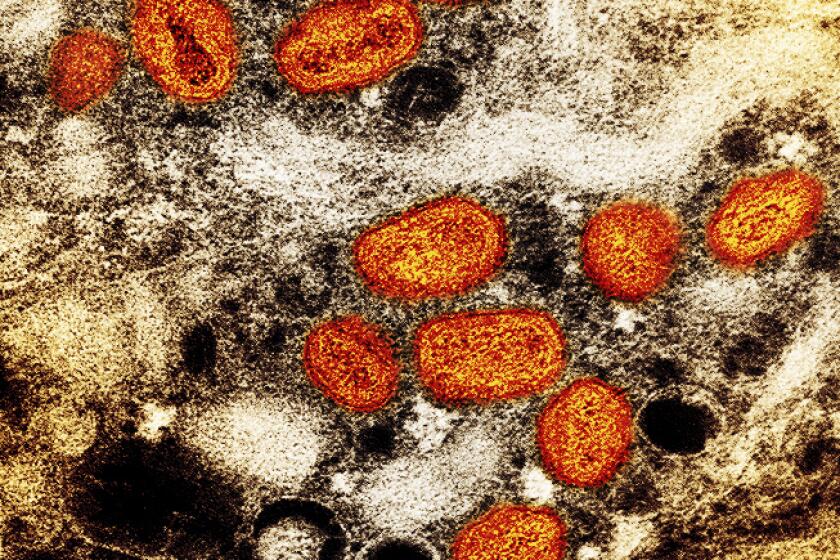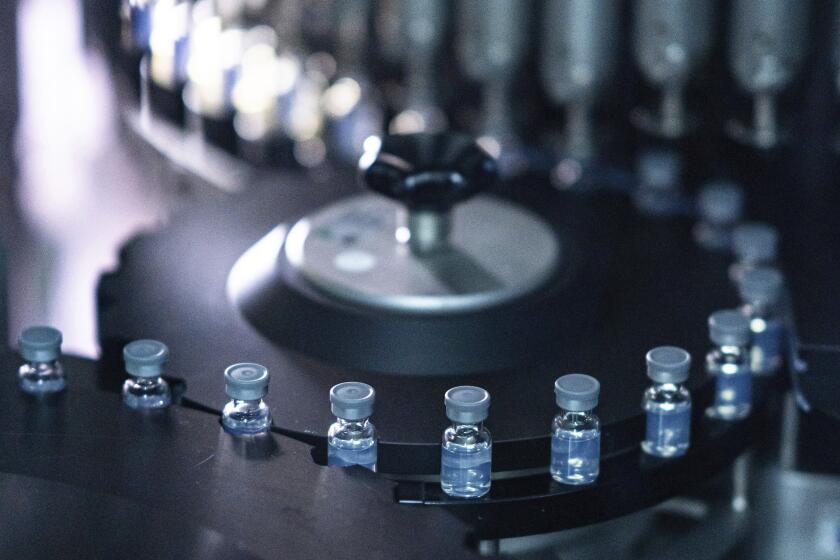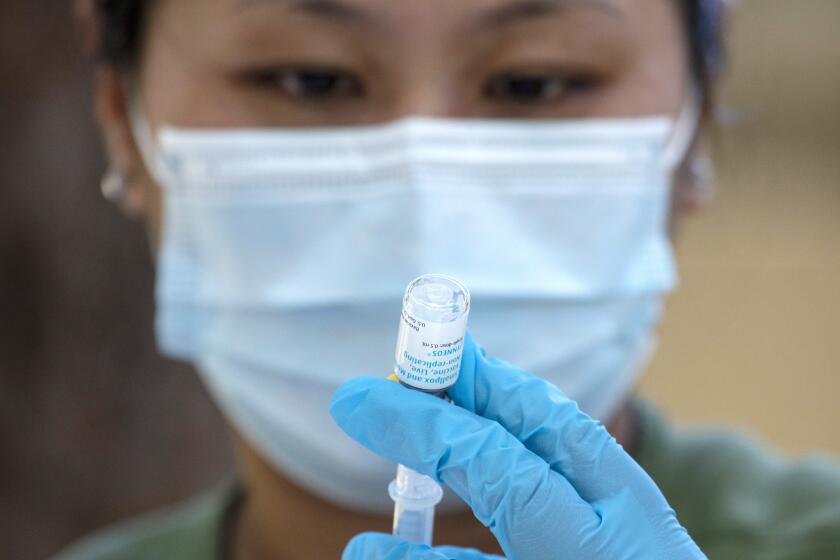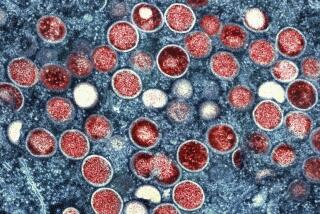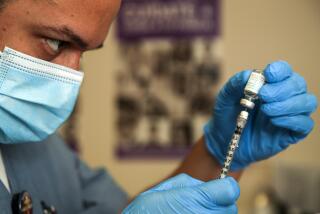MPX vaccines are becoming easier to access. Here’s how to get your shot
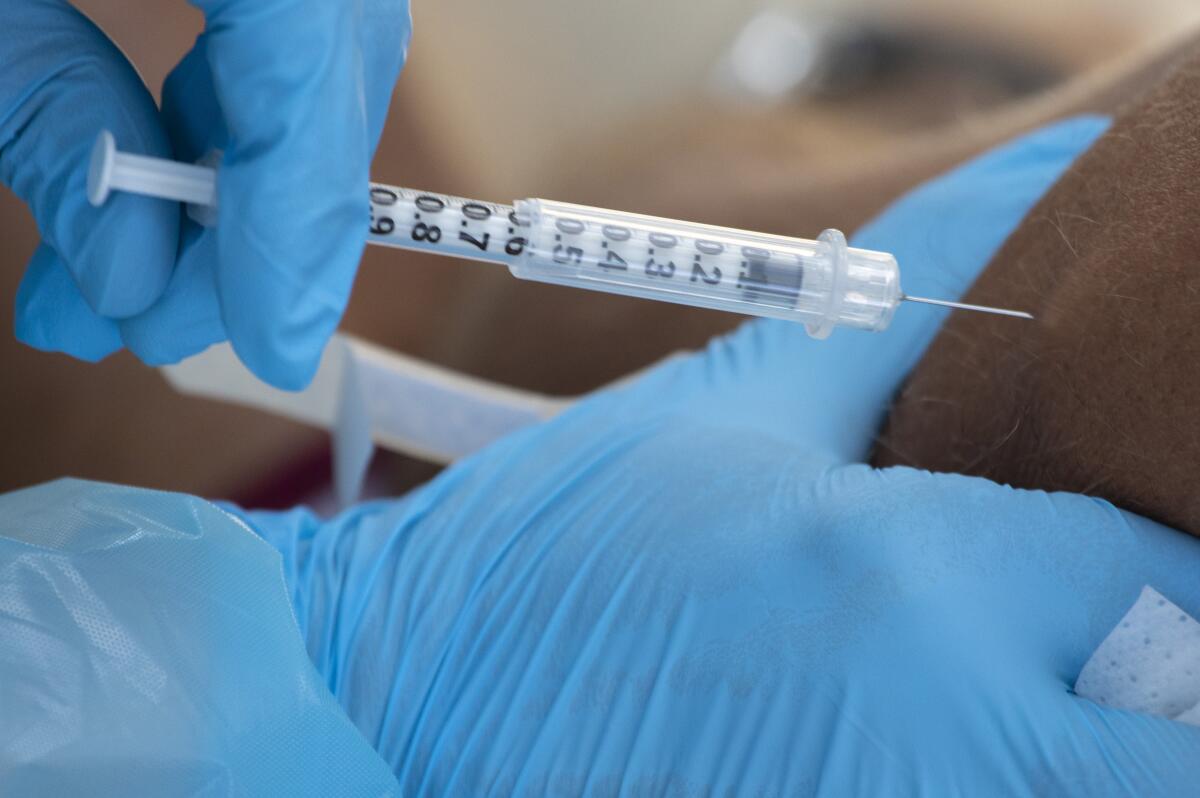
- Share via
MPX vaccines are easier to get than ever before.
L.A. County has expanded eligibility for the vaccine and made it more widely available at walk-up clinics around the county. A new statewide campaign is even offering free round-trip Uber rides for people looking to get their shots.
Cases of MPX have cratered after rising exponentially in early August. An encouraging bar chart from the L.A. County Department of Public Health visualizes the steep decline: There were over 200 new MPX cases each week in L.A. County during the month of August. But in the first week of September, there were just 148, and numbers have continued to fall. Statewide data show similar trends.
“The good news is … it does look like we have peaked and that things seem to be improving,” Dr. Erica Pan, California state epidemiologist, said last week.
MPX is very rarely fatal; the federal Centers for Disease Control and Prevention reports 62,406 global cases with 20 total deaths as of Monday. On Sept. 12, public health officials said Los Angeles County had recorded the nation’s first MPX death. The person was severely immunocompromised and had been hospitalized, officials said.
Cases in this outbreak continue to spread primarily among men who have sex with men and transgender people, though anyone can catch the virus. MPX is not easily transmitted, typically spreading through close skin-to-skin contact, which can include sex.
The county has administered more than 60,000 first doses of the MPX vaccine. After a shortage of the Jynneos vaccines this summer, availability across the nation has dramatically increased, stretched even further by a new method to administer the shots that requires only a fraction of a full vial.
Health officials still are not recommending widespread vaccination against the virus, as they say the risk to the general public remains low, but are hoping to target those most at risk with the shots.
A Los Angeles County resident has died due to monkeypox, also known as MPX — the nation’s first confirmed fatality linked to the disease.
Who’s eligible for the MPX vaccine?
Eligibility has been expanded to include people who may be at risk for future exposure to MPX. Several groups are newly eligible for an MPX vaccine as of Sept. 8: All gay or bisexual men; any men or transgender people who have sex with men or transgender people; anyone of any gender or sexual orientation who engages in commercial and/or transactional sex, including in exchange for goods, services, food and shelter; anyone with HIV; and anyone who has had skin-to-skin or intimate contact with someone with a suspected or confirmed case of MPX, even if the case has not been confirmed by the public health department.
Anyone who was previously eligible for vaccination for MPX remains eligible in L.A. County. That includes gay or bisexual men or transgender people who meet at least one of the following criteria:
- You have had multiple or anonymous sex partners in the last 14 days.
- You’ve had skin-to-skin or intimate contact (like kissing or hugging) with people at large venues or events in the last 14 days.
- You are on HIV pre-exposure prophylaxis, or PrEP, medication.
- You’ve had anonymous sex or sex with multiple people within the last 21 days at a commercial sex venue or other venue. (Carpenter said that would include things like a sex party, club, sauna or spa where people tend to engage in sexual activities, or an establishment where people pay to have sex.)
- You’ve had high or intermediate exposure to MPX (the CDC has a list of what qualifies as exposure at those levels).
- You’ve attended an event or venue where there was a high risk of exposure via skin-to-skin or sexual contact with people with MPX.
- You are experiencing homelessness and engaging in high-risk behaviors.
- You’ve had gonorrhea or early syphilis in the last 12 months.
- You are in jail and have been identified as high-risk by clinical staff.
- You are severely immunocompromised — for instance, you are undergoing chemotherapy, are on high-dose steroids or other immunosuppressants or have advanced or uncontrolled HIV.
For the record:
8:09 p.m. Sept. 22, 2022A previous version of this story said children who are 16 or 17 years old need to be accompanied by a parent or legal guardian or bring a signed consent form to get an MPX vaccine, and that children 15 or younger must be accompanied by an adult with a signed consent form. Those requirements have since changed.
Minors who meet eligibility criteria may get the vaccine. Those ages 12 to 17 may consent to receiving the shot at county vaccination sites. Children younger than 12 must be accompanied by a parent or legal guardian, or bring a consent form signed by one and be accompanied by a responsible adult.
The county is not requiring people to show ID in order to receive the vaccine, though it recommends people use the same name that appears on their ID in case they need to obtain their vaccination record at some point in the future. Vaccine sites will ask you to self-attest to your eligibility to receive the shot.
The CDC recommends people ages 12 and older get the new shots, which target the latest Omicron subvariants as well as the original coronavirus strain.
Where can I get the MPX vaccine?
You can visit Myturn.ca.gov to schedule your two-dose MPX vaccine at a pharmacy or find a walk-up clinic. While you’re there, consider getting your updated Omicron-targeting COVID-19 booster.
You can also get an MPX shot at one of the following walk-up public health clinics:
Balboa Sports Complex
17015 Burbank Blvd.
Encino, CA 91316
Hours: Wed.-Sun., 11 a.m.-6 p.m.
Market Street Center
22900 Market St.
Santa Clarita, CA 91321
Hours: Wed.-Sun., 12 p.m.-7 p.m.
Ted Watkins Memorial Park
1335 E 103rd St.
Los Angeles, CA 90002
Hours: Wed.-Sun., 11 a.m.-6 p.m.
Obregon Park
4021 E. 1st St.
Los Angeles, CA 90063
Hours: Wed.-Sun., 11 a.m.-6 p.m.
Do not go to a vaccination site if you have symptoms or think you have MPX. Call your doctor or the Department of Public Health at (833) 540-0473.
How can I access the free Uber ride?
People in need of transportation to get their vaccine can sign up to receive voucher for the ride-share app through a new partnership between Uber and Equality California, a statewide LGBTQ+ civil rights organization. The voucher will cover up to a $30 ride each way, but must be used solely for the purpose of traveling to and from an MPX vaccination site.
Request a code for the free rides here: eqca.org/monkeypox.
What about the second dose of the vaccine?
The Jynneos vaccine is supposed to be a two-dose regimen separated by about four weeks. Officials are encouraging people to get both doses to ensure optimal protection.
As of mid-September, L.A. County health officials said only about a third of those eligible for their second shot had received it.
People are considered fully vaccinated two weeks after receiving their second dose.
What treatment is available for MPX?
While most people recover from MPX without medical intervention, the Food and Drug Administration has approved an antiviral medicine that can be used in certain severe cases. Tecovirmat, often called TPOXX, has become much more accessible to MPX patients in recent weeks, after it was initially very difficult to find or get prescribed. The drug is only to be used for severe cases or for those at higher risk for severe disease, which includes people who are immunocompromised, pregnant or breastfeeding, or children, according to the CDC.
People in need of the treatment should consult their doctor or can call the L.A. County Public Health Call Center from 8 a.m. to 8:30 p.m. at (833) 540-0473.
As of Sept. 16, almost 400 people in L.A. County had received TPOXX, most commonly prescribed for severe pain or because of a lesion in a sensitive area, according to the county health department. The vast majority were not hospitalized, and about half had HIV.
Severely immunocompromised people are at risk for serious illness from MPX and advised “to seek medical care and treatment early and to remain under the care of a provider through the course of the disease,” said Dr. Rita Singhal, chief medical officer for the L.A. County Department of Public Health.
Experts around the world have pledged to change the disease’s name to something that doesn’t carry the weight of stigma. But tossing out the old term is easier than deciding on a new one.
Has the name of this virus changed?
Officially, not yet.
But in light of widespread concerns that the virus’ original name is racist and stigmatizing, the World Health Organization and other public health agencies have pledged to find a replacement. The WHO has started its formal process to rename the disease, though that will probably take months to complete.
In the meantime, California health officials have begun calling the disease MPX — pronounced mpox — which The Times has also adopted for its reporting.
More to Read
Sign up for Essential California
The most important California stories and recommendations in your inbox every morning.
You may occasionally receive promotional content from the Los Angeles Times.
